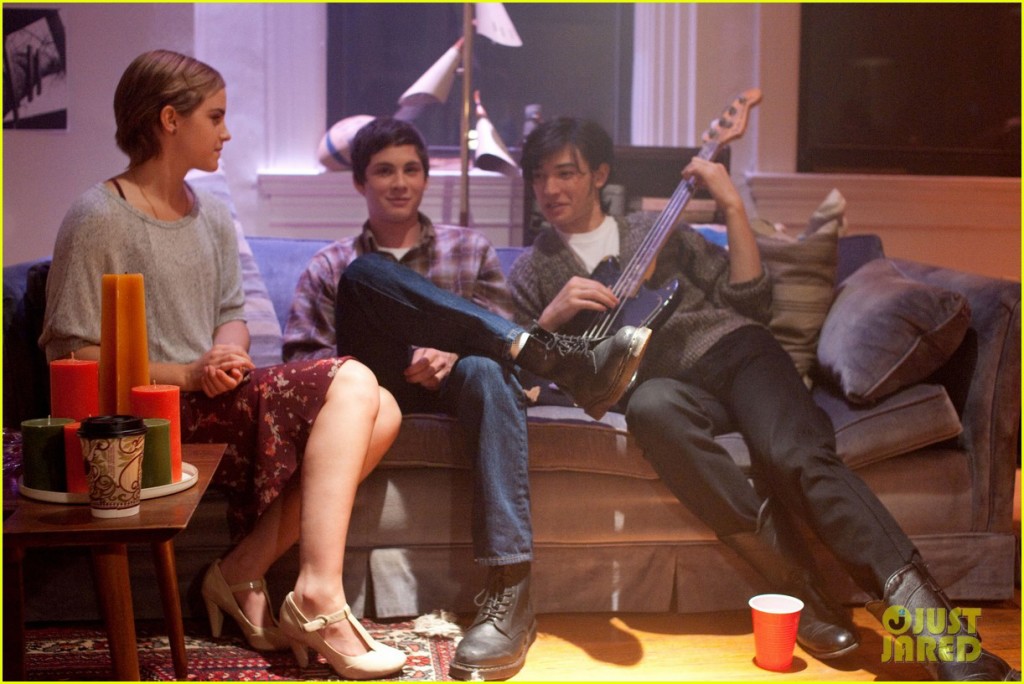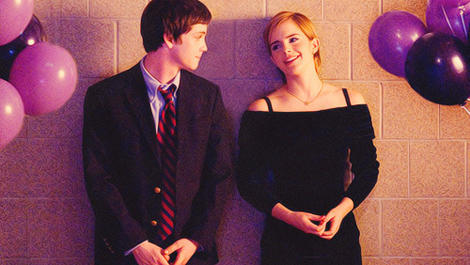Perks of Being a Wallflower (2012)
DIRECTOR: Stephen Chbosky
CAST: Logan Lerman, Emma Watson, Ezra Miller, Mae Whitman, Paul Rudd, Dylan McDermott, Kate Walsh, Nina Dobrev, Melanie Lynskey, Joan Cusack
REVIEW:
Perks of Being a Wallflower, adapted from the book by Stephen Chbosky, who also wrote the screenplay and directed the film version, is part of a heavily-populated genre—the “coming-of-age” story, and like many of them, it focuses on the outsiders and non-conformists who spent high school on the outside looking in. There are moments of truth that recall those in cinematic cousins like Fast Times at Ridgemont High (though Perks of Being a Wallflower is more serious), The Breakfast Club, and others, but Perks of Being a Wallflower has enough to offer on its own to make it feel fresh. The characters, situations, and emotions don’t feel forced or over-the-top, and there’s a wry, subdued humor that keeps things from getting too melancholy (although there’s some of that too) without exaggerating for comedic effect. It’s poignant, funny, bittersweet, warmhearted, and nostalgic—just like a lot of people’s memories of high school. The lead characters have their eccentricities, but a lot of their experiences will strike cords of memory with many viewers, speaking to the universality of some things about high school.
 Perks of Being a Wallflower mostly takes place over one year of high school in the 1980s in a suburb of Pittsburgh. Charlie (Logan Lerman), a timid and socially awkward but intelligent and observant loner, is intimidated by the transition from middle school to high school, but also sees it as an opportunity for a new beginning. However, apart from becoming an even smaller fish in an even bigger pond, Charlie finds not much changes. He’s still an outsider, and initially his only friend is his sympathetic English teacher Mr. Anderson (Paul Rudd). Eventually, though, he’s befriended by two other outsiders—the sibling, high school senior duo of tomboy Sam (Emma Watson, moving on from Harry Potter), and her gay brother Patrick (Ezra Miller), who flaunt their nonconformist status. After a time, Charlie is accepted into their circle, gaining friends and even a girlfriend in the outgoing Mary Elizabeth (Mae Whitman), although his true feelings run more toward Sam. But Charlie has unresolved, deep-rooted psychological scars, and as the confusion and up-and-down emotions of high school weigh heavier on him as his only friends’ graduation draws near, his emotional well-being grows more fragile.
Perks of Being a Wallflower mostly takes place over one year of high school in the 1980s in a suburb of Pittsburgh. Charlie (Logan Lerman), a timid and socially awkward but intelligent and observant loner, is intimidated by the transition from middle school to high school, but also sees it as an opportunity for a new beginning. However, apart from becoming an even smaller fish in an even bigger pond, Charlie finds not much changes. He’s still an outsider, and initially his only friend is his sympathetic English teacher Mr. Anderson (Paul Rudd). Eventually, though, he’s befriended by two other outsiders—the sibling, high school senior duo of tomboy Sam (Emma Watson, moving on from Harry Potter), and her gay brother Patrick (Ezra Miller), who flaunt their nonconformist status. After a time, Charlie is accepted into their circle, gaining friends and even a girlfriend in the outgoing Mary Elizabeth (Mae Whitman), although his true feelings run more toward Sam. But Charlie has unresolved, deep-rooted psychological scars, and as the confusion and up-and-down emotions of high school weigh heavier on him as his only friends’ graduation draws near, his emotional well-being grows more fragile.
 Perks of Being a Wallflower doesn’t do anything extraordinarily ambitious or original; it’s a low-key, familiar story, well-told, but that’s not a bad thing. The humor is subdued enough, and the drama feels real enough for them to coexist without ever feeling clashing. Like many high school movies, there are plenty of pop culture references thrown in. The Rocky Horror Picture Show is referenced significantly. ’80s hits like “Come On Eileen” and David Bowie’s “Heroes” are featured prominently. A lot of events onscreen—late night car rides with friends, a fight with bullies in the cafeteria, first awkward, fumbling kisses and aborted attempts at more, a Sadie Hawkins dance, and the mixed emotions leading up to graduation day—have a feel of emotional authenticity. I didn’t go to high school with anyone exactly like the three lead characters, but I felt like I could have. They feel like real people and real high schoolers, not cardboard cutouts or over-the-top caricatures like many less insightful films depict people their age. Like most movies of this type, the focus is solidly on the kids, with the adults as fleeting supporting characters. Only the supportive English teacher Mr. Anderson makes some impression. This is Charlie, Sam, and Patrick’s story.
Perks of Being a Wallflower doesn’t do anything extraordinarily ambitious or original; it’s a low-key, familiar story, well-told, but that’s not a bad thing. The humor is subdued enough, and the drama feels real enough for them to coexist without ever feeling clashing. Like many high school movies, there are plenty of pop culture references thrown in. The Rocky Horror Picture Show is referenced significantly. ’80s hits like “Come On Eileen” and David Bowie’s “Heroes” are featured prominently. A lot of events onscreen—late night car rides with friends, a fight with bullies in the cafeteria, first awkward, fumbling kisses and aborted attempts at more, a Sadie Hawkins dance, and the mixed emotions leading up to graduation day—have a feel of emotional authenticity. I didn’t go to high school with anyone exactly like the three lead characters, but I felt like I could have. They feel like real people and real high schoolers, not cardboard cutouts or over-the-top caricatures like many less insightful films depict people their age. Like most movies of this type, the focus is solidly on the kids, with the adults as fleeting supporting characters. Only the supportive English teacher Mr. Anderson makes some impression. This is Charlie, Sam, and Patrick’s story.
The cast is low-profile. Of the younger members, Emma Watson is the biggest “name” by virtue of having been Hermione Granger for eight movies of the Harry Potter series. The others—Logan Lerman, Ezra Miller, Mae Whitman—have some noteworthy credits to their names but are relative newcomers. Among the adults, there are a few familiar faces scattered around, including Dylan McDermott, Paul Rudd, and a small role for Joan Cusack, but no “big names”. In my opinion, there are times when the relative anonymity of an acting ensemble can actually help a movie, and this is one. The performances are solid, and the fact that many of the faces on-hand, including the lead, aren’t overly familiar ones may actually help us simply see them as their characters, with no preconceptions. Logan Lerman’s starring role in the young adult fantasy Percy Jackson films has gotten him some exposure, but low-key serious dramatic parts like this give him more chance to show his acting abilities. Lerman plays Charlie with an unforced, low-key earnestness, and is equally convincing when things get more dramatic and he portrays his emotions and composure spiraling out of control. Charlie is introverted and socially awkward, but he’s also intelligent, nonjudgmental, and sympathetic. So shyly and quietly that his powers of observation are sometimes underestimated, he sees and understands a lot about both Sam and Patrick—including Sam’s attempt to convince herself of her happiness with a cheating boyfriend, and Patrick’s relationship with a closeted jock who bullies him in public to protect his own secret—with empathy and insight. Emma Watson only needs a couple minutes for us to get beyond seeing her as Hermione Granger (the pixie haircut and American accent she adopts for this role helps set it apart), and she has some nice scenes and chemistry with Lerman, proving (as Daniel Radcliffe has also been striving to do) that there can still be a career after your days as a child star are behind you. Ezra Miller plays Patrick with an eccentric flamboyance that covers vulnerability. The nice thing about Miller’s performance is that he manages to play a gay character without making it all about the fact that his character is gay. Patrick feels like a real person, not a one-dimensional stereotype. In the supporting cast, Dylan McDermott doesn’t have much to do as Charlie’s father, while Paul Rudd, mostly associated with comedic roles, plays it straight as Mr. Anderson.
Perks of Being a Wallflower goes to a bit of an unexpected place in the final act. The groundwork has been established throughout the film, but Charlie’s breakdown and the final revelation of the source of his emotional problems give the movie a little more dramatic weight and set it apart from the pack. It’s to the credit of the well-constructed storyline and well-established characters that this detour doesn’t feel jarring with what has come before or out of left field, and it serves to make Perks of Being a Wallflower both a little more unique and a little more daring than some of its screen cousins. Things don’t get unremittingly dark, but it also doesn’t shy away from some heavy material.
Fans of the book should be pleased with the movie, considering writer Stephen Chbosky has had his hand on the screen adaptation every step of the way. For the uninitiated—like myself—it’s a pleasant and satisfying experience, covering familiar territory with a refreshing ring of truth that will make it emotionally meaningful to anyone with memories of high school, especially over the last few decades. It’s nothing hugely ambitious or original, but it’s intelligent and emotionally resonant, and those are laudable traits too few movies, especially those portraying high school characters, can boast.
* * *